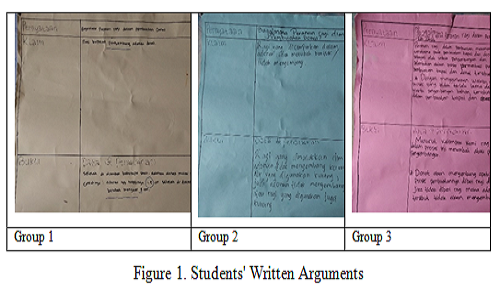
Junior High School Students Scientific Argumentation Skills on Conventional Biotechnology Materials
Abstract
Keywords
Full Text:
PDFReferences
Arani, Sarkar M. R. (2017). Raising the quality of teaching through Kyouzai Kenkyuu – the study of teaching materials. International Journal for Lesson and Learning Studies, 6(1), 10–26.
Chen, Y. C., Hand, B., & Park, S. (2016). Examining Elementary Students’ Development of Oral and Written Argumentation Practices Through Argument-Based Inquiry. Science and Education, 25(3–4), 277–320.
Crowell, A., & Kuhn, D. (2014). Developing Dialogic Argumentation Skills: A 3-year Intervention Study. Journal of Cognition and Development, 15(2), 363–381.
Ennis, R. H. (1985). A Logical Basis for Measuring Critical Thinking Skills. In Educational Leadership (Vol. 11, Nomor 1, hal. 46–48).
Farida, Lulu'Atul., et.al. (2018). Pengaruh Penerapan Model Pembelajaran Argument-Driven Inquiry (ADI) terhadap Keterampilan Argumentasi Siswa SMP Berdasarkan Perbedaan Jenis Kelamin. Journal of Physics and Science Learning, 2(2),25-36.
Fuad, N.M., et.al. (2017). Improving Junior High Schools’ Critical Thinking Skills Based on Test Three Different Models of Learning. International Journal of Instruction, Vol. 10 (1) hlm. 101-116.
Jimenez-Alexandre, M. P., & Erduran, S. (2007). Argumentation in Science Education: An Overview. 179–199.
Klein, P. D. (2006). The challenges of scientific literacy: From the viewpoint of secondgeneration cognitive science. International Journal of Science Education, 28(2–3), 143–178.
Neill, K. L. M. C., & Pimentel, D. S. (2009). Scientific Discourse in Three Urban Classrooms : The Role of the Teacher in Engaging High School Students in Argumentation.
Osborne, J. (2005). The role of argument in science education. Research and the Quality of Science Education, 367–380.
Roviati, Evi. & Ari Widodo. (2019). Kontribusi Argumentasi Ilmiah dalam Pengembangan Keterampilan Berpikir Kritis. Titian Ilmu: Jurnal Ilmiah Multi Sciences, 11(2), 56-66.
Sampson, V., Grooms, J., & Walker, J. P. (2011). Argument-Driven Inquiry as a way to help students learn how to participate in scientific argumentation and craft written arguments: An exploratory study. Science Education, 95(2), 217–257.
Wiersma, W. & Stephens, G. J. (2009). Research Methods in Education: An Introduction. 9th. Boston: Pearson.
Zubaedah. (2010). Berpikir Kritis : Kemampuan Berpikir Tingkat Tinggi. Seminar Nasional Sains 2010 dengan Tema “Optimalisasi Sains untuk Memberdayakan Manusia” di Pascasarjana Universitas Negeri Surabaya, 1–14.
DOI: http://dx.doi.org/10.31258/jes.6.1.p.143-157
Refbacks
- There are currently no refbacks.
Copyright (c) 2022 Reski Ivon Friska, Parsaoran Siahaan, Sumar Hendayana

This work is licensed under a Creative Commons Attribution 4.0 International License.
Publisher: FKIP Universitas Riau













